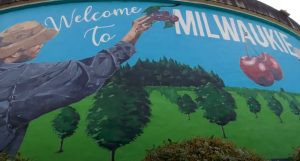The month of May is known as Asian American and Pacific Islander Heritage Month in the United States. This month recognizes the contributions and influence of Asian Americans and Pacific Islander Americans to the history, culture, and achievements of the United States. As of 2019, Asian Americans and Pacific Islanders compose roughly 6 percent of the nation’s population. According to the U.S. Department of Agriculture, the AAPI community makes up less than 1 percent of the nation’s agricultural producers. Despite being disproportionately represented in the farming industry, AAPI people have made tremendous strides in agriculture throughout history.
From advancements in science and technology to changes in agricultural policy and even diversified food experiences, AAPI-identifying people helped shape and diversify our food systems into what we know and love to date.
To honor them, here are three Asian American and/or Pacific Islanders in agriculture you need to know about and who should be celebrated for what they have done:
Larry Itillong (1913-1977)
Modesto “Larry” Dulay Itilong was a Filipino American labor leader who became well known for the Delano Grape Strike of 1960s, which won better pay and benefits for agricultural workers and led to the eventual formation of the United Farm Workers.
When we think of the Farm Workers Rights movement of that era, the Mexican American community and figures such as Cesar Chavez and Dolores Huerta are placed at the forefront. But what a lot of people do not know is that this movement extended beyond the Mexican American community; the Filipino American community had a large influence as well. In fact, it was the Filipino American community that initiated the strike, then the Mexican American community later joined in, according to a 1967 letter Itilong wrote.
Itilong’s activism extended beyond this one movement. He always had a reputation for being a prominent activist and leader in labor organizing throughout the West Coast.
In 1930, Itilong joined his first strike and co-founded the Alaska Canneries Workers Union. He also founded the Filipino Farm Labor Union and the multi-ethnic Agricultural Workers Organizing Committee (AWOC) after returning from his service in World War II in 1959.
In the 1970s, after his time with the United Farm Workers, he traveled to defend and organize farm workers in Brazil and Chile. In California, Itliong oversaw the completion of the Agbayani Village, a housing development for retired Filipino farm workers.
Itilong passed away in 1977 at 63 year old. California officially recognizes October 25 as “Larry Itliong Day” in honor of the labor leader’s legacy of fighting for social and economic justice.

Ah Bing (19th century)
The Bing cherry is the nation’s most produced cherry. What many don’t know is that this variety of cherry has a tragic history associated with it the person who first cultivated it.
Ah Bing was a Chinese immigrant living in Oregon and worked as a foreman for an orchard. He also worked with Seth Lewelling, grafting, propagating, and caring for trees.
One day while they were working, Bing discovered a new cherry variety in one of the rows he was maintaining — a variety that was ultimately named after him, the Bing cherry.
His discovery was successful and did great in the market at the time being sold for a dollar a pound. Bing had contributed to the American agricultural economy and discovered a new cherry all at the same time. However, his accomplishments and contributions to American agriculture were not enough to protect him from the anti-Chinese riots of the 19th century.
During this time, Lewelling sheltered Bing and his other Chinese laborers in his home, but this was not the life Bing wanted.
Bing longed for his home country of China and his family and made the decision to move back home. After moving, he was not allowed to return to the United States again, which may have been due to the Chinese Exclusion Act of 1882.
Though a contributing member of American society and our food system, Bing was not able to combat the anti-Asian racism that plagued society then. This made Bing a rather forgotten figure in history, but his legacy and popular cherry variety will continue to thrive.
Kukui Maunakea-Forth (Present day)
Hawaii has a long and complicated history with colonization and corporate colonialism, which has affected the landscape, culture, and relationship with their land. Fortunately, Hawaiian natives are making amazing strides in reclaiming their stories in agriculture.
Kukui Maunakea-Forth is a native Hawaiian and founder of MAʻO Organic Farms, an organic farm that embraces Hawaiian culture/tradition and cultivates future generations of farmers and scholars.
MA’O Organic Farms embraces an educational and collaborative approach to farming based on ‘auwai principle, a natural resource management system developed by Hawaiian natives that prioritized conservation, collective responsibility, and shared bounty. It also draws upon local youth for its labor force because of its educational value and learning opportunities for college students.
Student workers are given internship opportunities and sometimes even job opportunities at MA’O Organic Farms. With these opportunities, they help supply food for the community and learn about the ‘auwai principle for future generations at the same time.
MAʻO has become a powerful incubator for local education and self-improvement, all while providing fresh, organic vegetables to the Waiʻanae community — as well as dozens of grocers and restaurateurs for over two decades.
Maunakea-Forth oversees MA’O Organic Farms to this day and continues to thrive despite the challenges many were met with the start of the COVID-19 pandemic. She has done an exceptional job of enforcing a statement of self-determination amongst her community: to love and heal their land, and to love and feed their community.
One article is not enough to cover every AAPI identifying person in agriculture, nor is one month the only time of the year we should recognize our AAPI communities. We should be mindful of our coexisting communities all the time.
Agriculture does an amazing job at uniting us due to our connection to our land and need for food. Every community needs food and every community helps with our food system — just like a food web. Our food web could not exist without our AAPI allies: Let’s not forget that.
Saul Reyes serves as the 2022 American Farmland Trust Agriculture Communications Intern at AGDAILY, with a focus on helping to amplify diversity and minority voices in agriculture. An FFA alum, Reyes is a student at California State University-Chico and is double majoring in plant and soil science and multicultural and gender studies, while minoring in intersectional Chicanx/Latinx studies and public relations. He can be found on Twitter @sreyes710.





